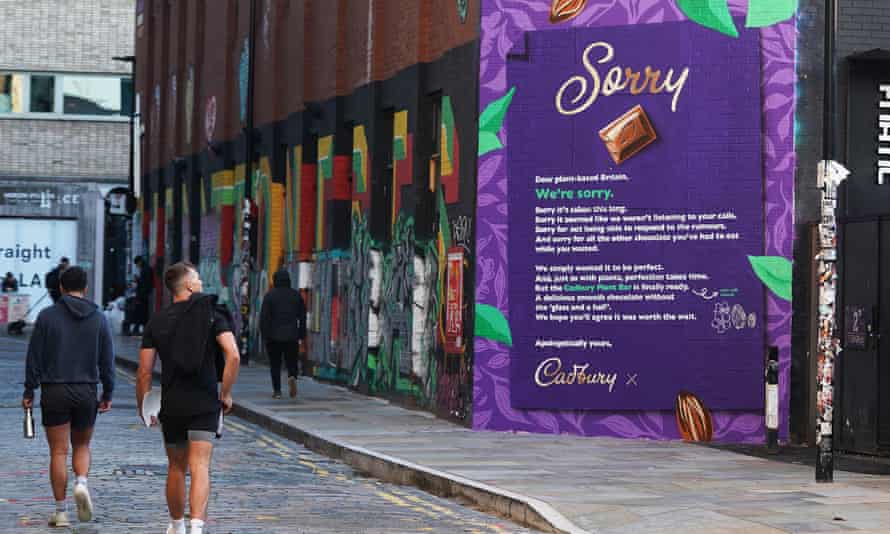From the Margins to the General Public: How Millions of People Wanted to Become Vegans | veganism
IThat says something about the rise of veganism which last week violated not one but two strongholds of British food culture. At first there were complaints after this fanfare of eggs, butter and cream, The Great British Cake, ended up with a separate yellow on her face when her first vegan candidate, 19-year-old Freya Cox, was given animal products to use during a tech challenge.
Then Cadbury announced that starting next month there will be a vegan alternative to its signature candy, the Dairy Milk chocolate bar. The Cadbury Plant Bar replaces the marzipan with the “glass and a half of milk†that is supposed to go into every Dairy Milk bar.
Both events grabbed the headlines because each, in their own way, signaled the growing incursion of veganism into “normal” life. And nothing, except maybe a cup of tea (which is anyway more and more made with oat milk), testifies to normalcy in Britain more emphatically than cakes and chocolate. .
It was exactly the kind of treats that, for many years, vegans had to forgo in their commitment to what was widely considered to be an ascetic way of life. But in addition to having undergone its own gastronomic revolution, with a multitude of cookbooks and recipes from famous chefs, veganism has recently undergone a radical overhaul of its image.
“I used to think of vegans as a mushy face and usually quite thin,†says Mike Harper, 61, who went vegan six years ago. Retired from North Devon, he switched from a vegetarian to a vegan diet under pressure from his daughters and quickly completed an Ironman triathlon.
That old vegan profile, which Harper soon learned was fake, followed the Cranks restaurant trail and the nut roast cliché. Instead of serious caricatures like Keith in Mike Leigh’s Play for Today in 1976, Walnuts in May, who loved to yawn about the importance of chewing, there are now a multitude of personalities – including Bella Hadid, Lewis Hamilton, Joaquin Phoenix, Thandie Newton and Natalie Portman – presenting a much more media image of veganism.
Meat consumption in this country has declined by 17% over the past decade. The Economist magazine named 2019 “The Year of the Vegan”. And last year, the World Health Organization recommended a plant-based diet for healthy living. This approval, along with growing concerns about the impact of dairy farming on the environment, combined with the lifestyle overhaul enabled by the lockdown, have dramatically increased the number of people turning their backs on Dairy products. animal origin in UK.
The exact number of vegans is almost impossible to establish, but surveys have shown rapid growth. One suggested there had been a 40% increase in 2020, bringing the total to around 1.5 million. That’s probably an overestimate, but certainly over 500,000 have pledged to eat vegan as part of this year’s Veganuary. As the numbers swell, so do the market and business opportunities, of course.
It’s not just the ready-made vegan meals that now line supermarket shelves or menu options in restaurants, but also the many lines of clothing and cosmetics. It is now possible to buy Dr Martens leatherless boots and Hermès bags made from mushroom, while Veja faux suede sneakers triumphed in the fashion stakes four years ago.
Alice Adams, novelist and former data analyst, says there have always been non-animal clothing alternatives – if not necessarily in fashion – but the labeling has changed.
“Now you look at the shoes and they’ll have a vegan label on them,†she says. “Regardless, leather has been replaced by other materials that work better in things like running shoes and hiking boots.”
A long-time vegetarian, she arrived at veganism over several years, before going all the way 15 years ago. “For most people,†she says, “it’s a process. For me, the cognitive dissonance got too much, and I finally tipped over. “

Likewise, veganism as a movement was born out of a schism in vegetarianism. In 1944, a few members of the British Vegetarian Society demanded that a section of the society’s newsletter be reserved for those who also avoided eggs and dairy products. When the request was flatly rejected, Leicester branch secretary Donald Watson rolled out a new quarterly. He coined the term “vegan”, taking the first three and the last two letters of vegetarian because, he said, that marked “the beginning and the end of vegetarian”.
The initial response was promising, drawing correspondence from over 100 supporters, including George Bernard Shaw who pledged to ditch eggs and dairy. Subsequently, progress was slow, with the transition from a diet without meat to a diet without any animal products often proving a chasm.
Adams says cheese is often the stumbling block. “Vegan cheese is generally awful. There is good vegan cheese in the world. In the United States, Miyoko makes an amazing vegan cheese, but it has yet to make it to the United Kingdom.
When Verna Burgess, 57, from Hertfordshire, entered veganism in the late 1980s, there was almost nothing available as a substitute. “You couldn’t even have ice cream,†she recalls.

She remembers the gradual introduction of products and brands, and when her local Waterstones cafe introduced the plant extract milk, she wrote a letter of gratitude to the manager. “I said, ‘Thank you very much. Now I can have a cappuccino.
For her, giving up such pleasures has never been a sacrifice because, as she says, she would think only of the suffering of animals. If meat is murder, then dairy is torture, by the calculation of most vegans. Increasingly, however, it is concerns about carbon production and the environment that are pushing a new generation towards plant-based diets.
Chandu Gopalakrishnan, sign language interpreter, is 24 years old and became vegan four years ago. “Initially, I did it more for environmental reasons,†she says, but then went to a vegan festival where she wore a virtual reality headset that showed the life and death of a dairy cow. “It was really immersive and very moving to see something so innocent being used so unnecessarily,†she says.
If this experience reinforced his veganism, the environment is still at the center of his concerns. She would like to see a system introduced in which the environmental impact is detailed on the packaging of meat and dairy products, in the same way that the health implications are displayed on cigarette packages.
“If it was side by side with a non-animal product that could be more expensive, then people could make an informed choice,†she says.
However, Mike Harper would prefer to see a more interventionist approach from the government.
“A lot of the vegans I know are from the white middle class,†he says. “But the point is, if you have a low salary and are raising a family, then you’re going to go with the cheaper food option. But if the government subsidized non-meat products, then people would try them. “
It’s hard to imagine a laissez-faire government with close ties to the traditional agricultural industry making this kind of move anytime soon. Despite all the contemporary interest in veganism, the global demand for dairy products continues to increase, mainly due to population growth and the westernization of diets in countries like China and India. In this massive context, the insensitivity of The Great British Cake the production team or the introduction of a new candy bar hardly seems of great importance.
Yet such gestures and options spring new futures. A generation ago, vegans were seen as boring moralizers. As the old joke used to say, “How do you know someone is vegan?” Answer: They will tell you. Today, a plant-based diet is viewed by an ever-increasing number of people as the only reasonable course to follow. In the years to come, even the most cheese-loving carnivores will have no choice but to consider it, if only as food for thought.
In numbers
79 million
The estimated number of vegans in the world
500,000
People who attended Veganuary in the UK this year, up from 400,000 in 2020 and 250,000 in 2019
66%
The proportion of UK vegans who are female
163%
The increase in vegan orders for Deliveroo in the UK in 2020 compared to 2019
55,000
The number of products with the Vegan Society vegan registered trademark, including 18,000 food and drink products
$ 24.3 billion
The projected size of the global vegan food market by 2026, with cosmetics worth $ 20.8 billion

